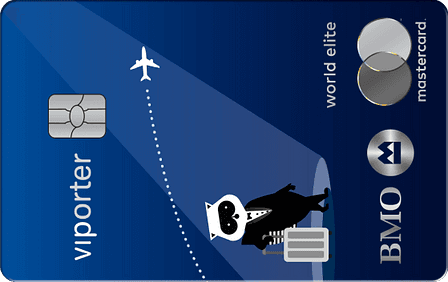
What Is Credit Card Trip Interruption Insurance?
Sara Skodak
Author8 min read
Nobody wants their vacation to come to an end. Sometimes, this happens sooner than it's supposed to. So, what do you do if your trip suddenly gets cut short due to unforeseen circumstances?
The answer is inside your wallet. No, we're not referring to the extra payments that follow an emergency, we're talking about credit card trip interruption insurance. This credit card policy reimburses those remaining non-refundable expenses for covered reasons when your trip ends sooner than expected.
What Does Credit Card Trip Interruption Insurance Cover?
Imagine that you've arrived at your destination, you're enjoying the sun, the beach, and the sand between your toes. Gradually, things start to take a turn. The sun hides behind dark clouds and the ocean begins to stir. Next thing you know, you're being warned about severe weather, dangerous enough to prompt an evacuation. The problem is, you still have 4 nights left of your stay.
Or maybe on the other side of the world, you tripped over a cobblestone while sightseeing and sprained your ankle badly enough to book a flight back home to be properly treated.
In either case, your credit card's trip interruption insurance can reimburse all your remaining non-refundable expenses, plus provide alternative flight plans and transportation. As long as the scenario is listed by your provider, you can expect insurance coverages between $1000 to $5000 per person and $5000 to $25,000 maximum per trip.
Since coverage can vary widely between different credit cards, the amount of insurance you'll receive will depend on the card's specific policies, this is why you should always read each card's terms individually and carefully.
There are some specific circumstances that are likely covered by your credit card trip interruption insurance, here are a few common ones:
- Sickness, injury or death of the insured or an immediate family member
- Delays that interrupt any part of the trip, usually because of weather, road closures or travel advisories, making the insured party miss a connecting flight
- A formal notice from the Department of Foreign Affairs advising Canadians not to travel to a specified country on the itinerary
Each eligible credit card will have different policies on what they cover in terms of trip cancellation and trip interruption, that's why it's crucial to familiarize yourself with all the travel insurance terms and conditions.
What is NOT Covered by Trip Interruption Insurance?
It's important to note that there's a list of cases where you won't be covered by credit card trip interruption insurance, here are some situations that don't qualify:
- Voluntary cancellation, such as changing your mind for personal reasons rather than covered ones
- Alcohol or drug abuse by the insured person
- Changes in your work schedule or an anticipated work conflict
- Pre-existing medical conditions or illnesses you knew about before the trip
- The participation in criminal activity by the insured person during their trip
- Intentional self-inflicted injuries
- Injuries from at-risk activities like bungee-jumping, skydiving or mountain climbing
- Childbirth or pregnancy-related reasons when traveling within 9 weeks of the expected delivery date
- Travel warnings that were issued before departure instead of during the trip
As always though, you'll want to review your credit card's terms and conditions to identify what it does and doesn't cover.
Credit Card Trip Cancellation Insurance vs. Credit Card Trip Interruption Insurance
You'll often see both these policies featured on certain travel insured credit cards. While different, they compliment each other by providing optimal coverage for on-the-go cardholders.
As you know, credit card trip interruption insurance is when a credit card reimburses the covered remaining expenses of an unfinished trip. Credit card trip cancellation insurance is when the trip must be canceled altogether before happening in the first place.
Both policies have similarities and reimburse non-refundable and non-transferable payments. Still, it's best to review their terms and conditions separately.
Does Credit Card Trip Interruption Insurance Cover Airline Delays?
Usually, when an airline cancels or delays a flight, they must book their passengers on the next available departure or provide a reimbursement if another flight is not possible. Some cards even offer extra flight and baggage delay coverage after a certain amount of time depending on the circumstance.
If the initial flight disruption causes you to miss a connecting flight later on, your credit card trip interruption insurance may be able to reimburse your connecting flight's tickets. Trip delay policies can also help with situations like accommodation coverage while you wait for the rest of your trip to continue.
How Much Does Credit Card Trip Interruption Insurance Cost?
Credit card trip interruption insurance is an added benefit on certain credit cards. Any costs connected to the trip interruption insurance comes from costs linked to the credit card, specifically annual fees. Annual fees vary from card to card and are usually based on what the card has to offer.
Most credit cards with travel insurance come with an annual fee, plus some impressive travel perks. If you're someone who travels a lot, enjoys the luxury of an airport lounge or points redeemed for flights, then the upfront investment will be worth it.
If you'd rather not pay an annual fee, but still want to be insured under trip cancellation and trip interruption, cards like the Rogers World Elite Mastercard and Desjardins Cash Back Mastercard offer this coverage at no extra cost, which is an amazing perk considering it's usually uncommon for no-fee cards to to have travel insurance.
Overall, it could cost you more to not have credit card trip interruption insurance than to have it. Non-refundable expenses can range anywhere from prepaid hotel stays, excursions or deposits and can cost anywhere from hundreds to thousands of dollars. Without some sort of coverage, you'll be out the entirety of these costs when you could've had some sort of reimbursement otherwise.
What Kinds of Reimbursements Can You Expect With Credit Card Trip Interruption Insurance?
The amount you'll be reimbursed for your eligible non-refundable expenses depends on what you're seeking coverage on and your credit card company's policies. You can be reimbursed as an individual, or in some cases, your spouse and children are also covered up to a certain amount per trip depending on what terms your credit card has in place.
Oftentimes, the higher your credit card's annual fee, the more insurance you'll have.
How to Make a Credit Card Trip Interruption Claim
First of all, you'll need to contact the insurer as soon as possible. There are usually timelines you need to follow to file a claim, so you'll want to read up on those in your card's travel insurance certificate. This certificate should also supply you with the correct contact information, which is who you'll want to speak to for next steps.
For trip interruption cases, you might need to gather documentation such as cancelled leftover hotel bookings, connecting flight tickets, or medical records. As a general tip, have proof of cancellation and proof of the reason for cancellation as it applies to a covered reason on the card ready. It pays to be prepared.
In the end, to file a successful claim, always follow your insurer's specific guidelines.
How to Select the Best Credit Card for Credit Card Trip Interruption Insurance
Credit cards that specialize in travel benefits usually come with good coverage policies. If you travel often, have a high credit score and income, and don't mind spending extra money annually for airport lounge access and no foreign transaction fees, there are plenty of premium options for you. If you're loyal to a particular airline, there are even cards with both trip interruption insurance and airline-specific perks.
Ultimately, the best credit cards for credit card trip interruption insurance are the ones complete with credit card trip cancellation insurance. When paired together, coverage is easier to claim, without you having to pay for the policies separately. Plus, some cards even require the entire trip to be booked on the same card in the first place, so you'll want all your credit card travel insurance on one account.
Overall, selecting the right card comes down to which options check off the most boxes in terms of things like budget, travel habits, and rewards. The key is to customize your credit card and its coverage to your lifestyle.
Conclusion
Plan for the unexpected. That way, if you ever find yourself packing up before you're supposed to, you can at least know that you'll be compensated for the inconvenience.
Set aside time to read your credit card's policy, browse which cards offer the best credit card trip interruption insurance for your needs, and most importantly, travel with confidence.
Frequently Asked Questions
What does credit card travel insurance cover?
Different credit cards have different types of travel coverage. Both credit card trip interruption insurance and credit card trip cancellation insurance are examples of credit card travel insurance. Some cards also offer coverage for lost or stolen baggage, rental car damage or theft, hotel burglary, or emergency out of province medical insurance.
Does my credit card automatically have travel insurance?
No, not every credit card is automatically equipped with travel insurance. Travel insurance is an added perk to certain credit cards, usually ones with an annual fee.
How do I know if my credit card has travel insurance?
If you're unsure whether your credit card has travel insurance, you can always check your issuer's website or your credit card agreement.
Trending Offers

Scotiabank Passport® Visa Infinite* Card

BMO VIPorter World Elite Mastercard®∗

Scotia Momentum® Visa Infinite* Card

BMO VIPorter Mastercard®∗

Scotiabank Value® Visa* Card
What's on this Page
- What Does Credit Card Trip Interruption Insurance Cover?
- What is NOT Covered by Trip Interruption Insurance?
- Credit Card Trip Cancellation Insurance vs. Credit Card Trip Interruption Insurance
- Does Credit Card Trip Interruption Insurance Cover Airline Delays?
- How Much Does Credit Card Trip Interruption Insurance Cost?
- What Kinds of Reimbursements Can You Expect With Credit Card Trip Interruption Insurance?
- How to Make a Credit Card Trip Interruption Claim
- How to Select the Best Credit Card for Credit Card Trip Interruption Insurance
- Conclusion
- Frequently Asked Questions